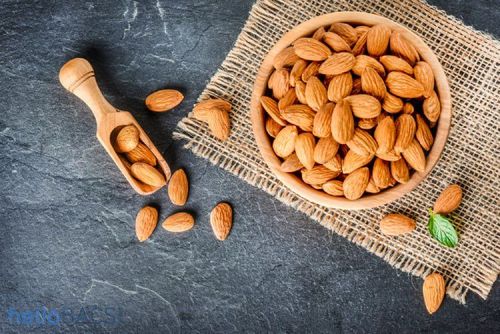This is an automatically translated article.
Almonds are one of the most popular tree nuts in the world. Almonds contain many vitamins, minerals, protein and fiber, so they can bring many health benefits to users. People can eat raw or toasted almonds as a snack or add them to sweet or savory dishes. They are also available in sliced, flakes, and flakes, as a powder, oil, butter, or almond milk. In this article, we will provide useful information for you to better understand the nutritional components of almonds and why almonds are popular.
1. Where do almonds come from?
Almond is a tree nut native to the Mediterranean region. Historically, almond trees grew wild there and were later planted by indigenous people around 3000 BC. Almonds are even mentioned in the first book of the Bible, Genesis, as a prized food to give as a gift. Almonds have an outer shell and the skin is usually inedible, the only edible part being a seed within it. After the almond kernels are extracted, the shell is often used as animal feed and as a barn filler.

Hạnh nhân có đem lại nhiều lợi ích cho sức khỏe
2. Nutrition in almonds.
In almonds there are many nutrients such as monounsaturated fat, fiber, biotin, vitamin E, phytonutrients (Flavonoids, plant sterols, phenolic acids). It is considered a calorie-dense but also nutrient-dense food with most of the fat being monounsaturated fat. In 1 ounce (28g) of almonds contains the following ingredients:
| Thành phần | Hàm lượng |
| Tổng lượng chất béo | 14,2 g |
| Carbohydrate | 6,11 g |
| Chất xơ | 3,54 g |
| Đường | 1,23 g |
| Canxi | 76,3 mg |
| Sắt | 1,05 mg |
| Magie | 76,5 mg |
| Kali | 208 mg |
| Riboflavin | 0,323 mg |
A 2005 study published in the Journal of Nutrition found that packaged almonds have the greatest nutritional content if eaten whole, with the brown skin, rather than the steamed shell. Research has identified 20 powerful antioxidant flavonoids in almond skins. Combined with the high vitamin E content in the flesh of almonds, these flavonoids give almonds a unique nutritional package that can have an impact on cholesterol levels, inflammation and more. In addition, almonds are also a food with a low glycemic index, which is very good for patients with diabetes
Due to the diverse source of nutrients in almonds, the benefits that almonds bring to health are: very big. Almonds are thought to reduce the risk of heart disease by lowering total and LDL cholesterol.

Hạnh nhân có tác dụng kiểm soát chỉ số đường huyết
3. Health benefits of almonds
For the heart The effect of kernels on the heart is undeniable, over nearly 2 decades of research by Mr. Heap, he has shown that: almonds can help maintain a healthy heart and cholesterol levels stable. “There is growing evidence that regularly using almonds in place of snacks high in refined carbohydrates is a simple dietary strategy to help support heart health,” said Mr. Heap. In another review published in 1999 in Current Atherosclerosis Reports, researchers looked at the Nurses' Health Study and estimated that eating nuts instead of an equivalent amount of carbohydrates Reduces the risk of heart disease by up to 30%. Replacing nuts with saturated fats, such as those found in meat and dairy products, reduced the risk by an estimated 45%. A 2009 article in The American Journal of Clinical Nutrition (AJCN) pointed to evidence of nut consumption and many health problems. It turns out that four large-scale studies are considered major in the field: the Iowa Women's Health Study (1996), the Adventist Health Study (1992), the Nurses' Health Study (1998) and the Physicians ' Health Study (2002) has shown that: consumption of almonds is associated with a reduced risk of heart disease. Taking the results of the studies together, the researchers showed an average 37% reduction in the risk of dying from heart disease. According to the American Heart Association, one serving of almonds provides 5% of the daily recommended value of potassium, which is essential for heart health. Many studies have linked potassium to lower blood pressure because it promotes vasodilation (widening of blood vessels). A study of 12,000 adults, published in the Archives of Internal Medicine, found that those who consumed 4,069 mg of potassium per day reduced their risk of cardiovascular disease and ischemia by 37% and 49%, respectively, compared with those who consumed 4,069 mg of potassium per day. with those taking 1,793 mg per day.
Besides, the use of almonds to supplement saturated fat can also help reduce LDL cholesterol (bad cholesterol). A 1994 study published in The American Journal of Clinical Nutrition studied men with normal cholesterol levels and found that those who added almonds to their diets for three weeks experienced a reduction in cholesterol. 10% of LDL levels or most recently a 2017 study published in the Journal of Nutrition looked at 82 people with high LDL cholesterol. After six weeks, they ate a low-cholesterol diet that included one-third cup of almonds or a muffin with the same number of calories. Then, the participants switched diets for another six weeks. The researchers found that the almond diet resulted in better distribution of HDL cholesterol and more efficient removal of cholesterol.
Magnesium is also a non-nutrient essential for heart health. According to the University of Maryland Medical Center, some doctors have seen positive results when giving magnesium to patients with heart failure. Additionally, almonds may even be good for people with hyperlipidemia (excess lipids or lipoproteins in the blood). These patients were once instructed to stay away from nuts because of their fat content, but a study published in 2002 in the journal Circulation found that hyperlipidemic patients ate almonds as a snack. mild actually significantly reduced heart disease risk factors.

Muốn có một trái tim khỏe mạnh, bạn nên bổ sung hạt nhân vào chế độ ăn
Almonds in weight loss diet Mr. Heap concluded: “With a combination of protein, fiber, and good fats, almonds are a smart snack choice to help satisfy your hunger. people while cravings". He also noted that choosing almonds as a daily snack does not affect the body's weight, replacing almonds with other snacks also helps people who are on a diet. A reliable 2003 study, published in the International Journal of Obesity and Related Metabolic Disorders, found that combining almonds with a low-calorie, monounsaturated fat diet led to to greater weight loss than low-calorie diets high in complex carbohydrates. Another study published in 2015 in the Journal of the American Heart Association tested substituting almonds for a muffin with the same calorie value and found that although the participants did not lose In both groups, the almond-eating groups reduced belly fat, waist circumference, and leg fat, as well as improved LDL cholesterol levels.
Almonds can also be considered a more satisfying snack than carb-rich berries. “The combination of protein, fiber and good fats make them a satisfying snack option that can help keep you from having to choose empty calories between meals,” says Heap. "In fact, a recent study showed that women who ate a mid-morning snack of 1-1.5 ounces of almonds felt more satisfied and ate fewer calories at subsequent meals. A five-year study conducted by Loma Linda University researchers and published in the European Journal of Nutrition in 2017 found that people who ate nuts, including almonds, more often are more likely to stop gaining weight and reduce their risk of being overweight or obese by 5%, the study evaluated more than 73,000 Europeans between the ages of 25 and 70 and found that, while most of the participants were While those who regularly ate nuts gained less weight by an average of 2.1 kilograms over five years, those who regularly ate nuts gained less weight, the study's lead researcher, Dr. Joan Sabate, advised people to substitute animal protein in between. their plate with nuts
Mr. Heap says: “Almonds are naturally gluten-free and are a versatile, nutrient-rich addition to the diet. gluten-free. "Because a gluten-free diet can be low in iron, fiber, B vitamins and protein, as well as high in saturated fat and sugar, it's important to help fill in these gaps and optimize nutrition." . All forms of almonds, including almond flour, almond milk, and almond butter, are great additions for people choosing a gluten-free lifestyle."

Bạn có thể kiểm soát cân nặng thông qua việc tiêu thụ hạnh nhân
For Diabetes Almonds may be helpful in regulating blood sugar levels, a 2006 study published in the Journal of Nutrition found that participants ate an almond-based controlled diet. , rice, potatoes or bread. The researchers found that the blood sugar and insulin levels of the participants decreased after eating the almond meal, but not the others. In addition, blood antioxidants increased after the almond meal, while they decreased after other meals. Almonds can also help lower the glycemic index after a meal for people with high glycemic index. A 2007 study, published in the journal Metabolism, investigated the combination of almonds and bread-based meals. The more almonds the participants ate, the lower the meal's glycemic index and the less the participants' blood sugar rose. Eating 3 ounces of almonds with a meal made with bread reduced the glycemic index of the meal by less than half compared with a meal containing only bread.
Gives Energy Almonds provide a very good source of energy such as riboflavin, manganese and copper. Riboflavin is also known as vitamin B2, according to the National Institutes of Health it helps in the production of red blood cells and the release of energy from carbohydrates. Manganese and copper are components in an enzyme that blocks free radicals in the mitochondria, where our cells produce energy, according to World's Healthiest Foods. In this way, these trace minerals help maintain the energy flow of the body.
Prevents Gallstones The fat and fiber content in almonds can help prevent gallstones by keeping the gallbladder and liver functioning smoothly. An analysis by the Nurses' Health Study found that people who ate nuts regularly were 25% less likely to need a cholecystectomy, a procedure to remove the gallbladder commonly performed to treat gallstones. Another study, published in 2004 in the American Journal of Epidemiology, found similar results in men, with regular nut eaters having a 30 percent reduced risk of gallstones.
Cancer A 2017 observational study of 826 patients with colon cancer found that those who ate 2 ounces or more of tree nuts, including almonds, a week "had an increased risk of cancer recurrence." 42% lower and 57% less likely to die than people who don't eat nuts," according to the study published in the American Society of Clinical Oncology. The researchers do not suggest replacing chemotherapy with tree nuts. "Instead, colon cancer patients should be optimistic and they should eat a healthy diet, including tree nuts, which will not only make them healthier but may also reduce their chances of cancer." Occur again periodically." Also, the antioxidants and vitamin E in almonds may have anti-cancer benefits, although the National Cancer Institute warns that results from studies examining antioxidants, vitamins and cancer is inconclusive.
Please dial HOTLINE for more information or register for an appointment HERE. Download MyVinmec app to make appointments faster and to manage your bookings easily.
References: livescience.com, hsph.harvard.edu













